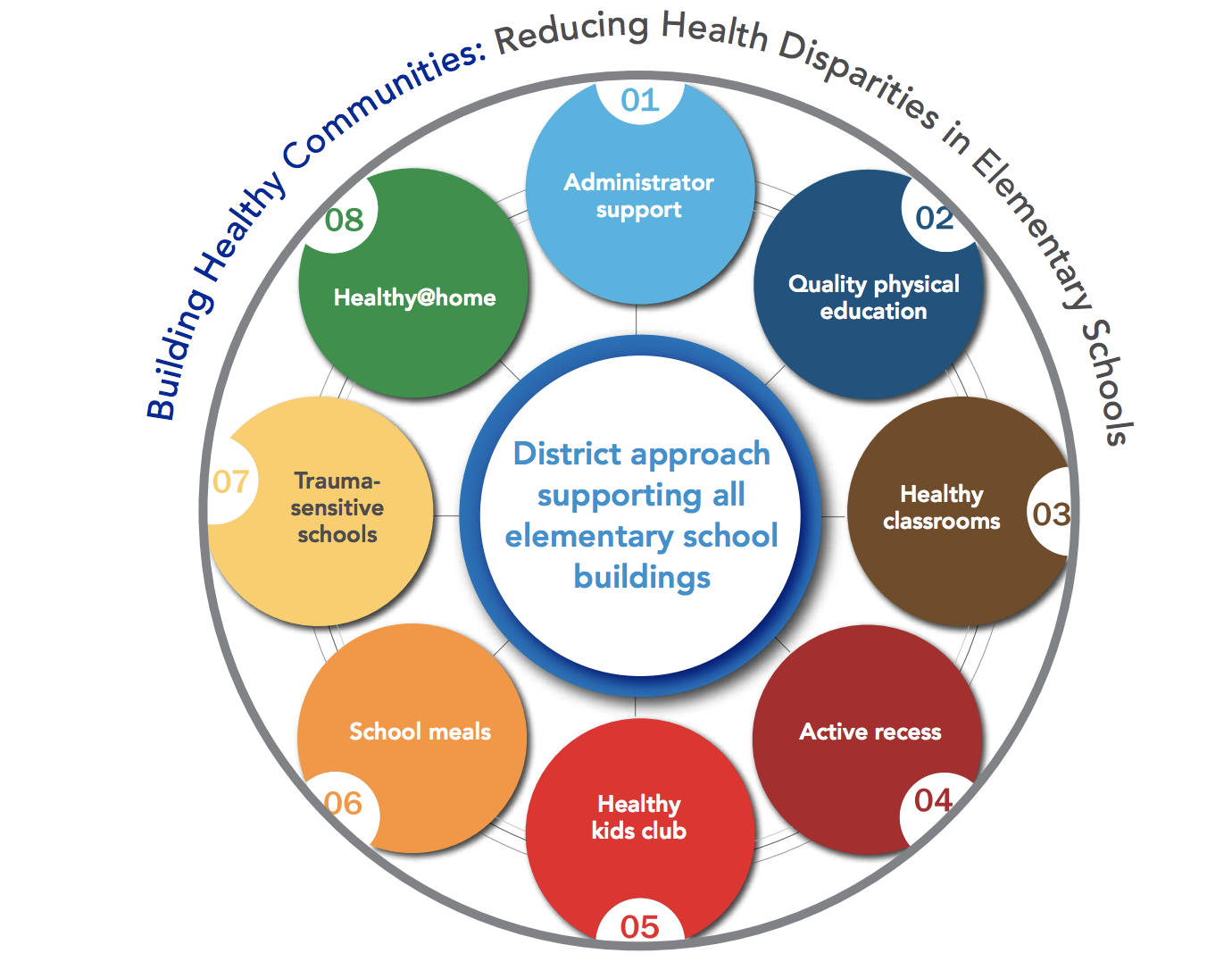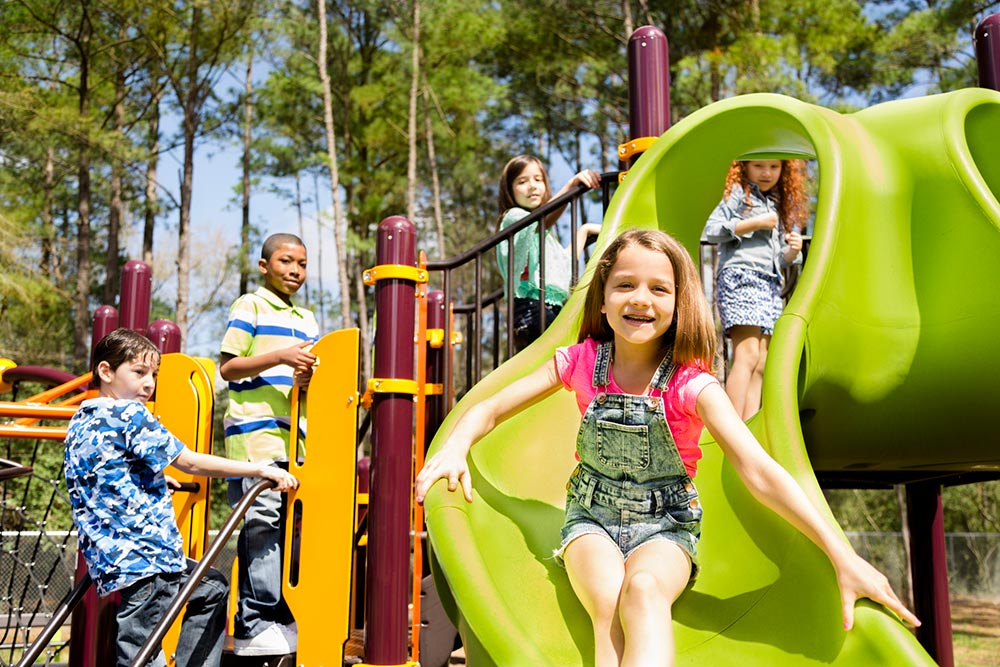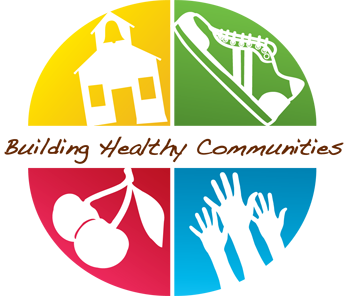Our Model

See below for our Program Model specific descriptions.
District Level Approach
Building Healthy Communities is a school-based program focused on addressing the social determinants of health that have contributed to wide disparities in many communities across Michigan. The program offers all of the schools in a district necessary resources to facilitate a healthier environment, prevent chronic disease, and improve the mental health of children. Recruiting entire school districts is an intentional and coordinated effort to facilitate sustainable, systems-wide change focused on healthy living opportunities, access to resources, education, and policies throughout ENTIRE communities. The quality and quantity of support we are able to offer through the program is increased by serving a whole district at a time. And, healthy changes are more sustainable if they are supported and encouraged at a district level.
During the school year, the Healthy School Champions and administrators from each elementary school will work collaboratively with district administrators and their Healthy School Coordinator to evaluate current school wellness policies, identify areas that need to be strengthened, and develop plans for implementation. We believe that through this teamwork, students, staff and communities will benefit from policies that encourage health and wellness for students and their families.
The Elementary School Model
Changes in policies are made at a district level, but specific health education and physical activity opportunities are provided in each elementary school as part of the healthy transformation process. There are eight core components that together enhance the health environment of each school and surround children with education, resources and opportunities to live healthy lives. We provide all of the resources, training, coaching and equipment that is needed to fully implement each of the program goals. Because each school receives so many quality resources, sustainability is possible in each school, which allows for increased overall health of the district and community for years to come.

Administrator Support
Engaged and supportive school administrators are vital to successful healthy school initiatives. As part of Building Healthy Communities, school administrators:
- Provide vocal support for healthy eating and regular physical activity throughout the school day;
- Allow program banners, posters and other signage to be displayed;
- Ensure that “Healthy tips of the day” are shared with the school community in a manner appropriate for the school;
- Identify optimal training times for staff throughout the year;
- Appoint someone to serve as a paid, on-site “Healthy School Champion”
- Oversee regular communication with parents and caregivers about health-related topics and utilize social media, newsletter inserts, Healthy@home, and other available resources.

Quality Physical Education
Physical education is foundational for healthy schools. It teaches the knowledge, attitudes and skills to be active for life. As part of Building Healthy Communities, physical education teachers have access to professional development and receive the following equipment and support:
- The Exemplary Physical Education Curriculum (EPEC) and training materials;
- Convenient access to a clearinghouse of diverse, standards-based in-person and virtual PE activities that are prepackaged for easy implementation;
- Short virtual professional development training modules covering many aspects of quality physical education; and
- A large package of lifetime-guaranteed physical education equipment

Healthy Classrooms
As part of Building Healthy Communities, classroom teachers integrate short nutrition lessons monthly, incorporate physical activity breaks daily, promote healthy classroom policies throughout the year, and communicate regularly with parents. We provide the following to support their efforts:
- Professional development modules on teaching nutrition basics and incorporating physical activity breaks;
- An online library of virtual nutrition education lessons for teachers to choose from;
- Fun and easily accessible virtual physical activity breaks for classrooms;
- Healthy@home virtual healthy living resources to share with parents and caregivers to complement lessons learned in the classroom and the broader program; and
- Guidance for healthy classroom policies.

Active Recess
Recess provides children with valuable opportunities to participate in physical activities that enhance health, social interaction, learning readiness and appropriate classroom behavior. Recess monitors and students receive the following resources and supports:
- Training for recess best-practices, discipline management, and promoting movement;
- An online library of easy, fun games to promote activity during recess;
- A generously stocked mobile cart containing physical activity equipment with a lifetime guarantee; and
- Activity cards attached to the recess cart with numerous easy and fun games.

Healthy Kids Club
Before and after school opportunities for physical activity and nutrition education give students yet another environment to practice making healthy choices. This is especially important for under-resourced communities that lack opportunities outside of school. As part of Building Healthy Communities, your school will incorporate a weekly Healthy Kid’s Club from October to May. To support this club we provide:
- Training modules on partnering with or implementing new before or after school programs successfully;
- A proven model and step-by-step instructions for implementing your club;
- Funding to support a dedicated club leader and healthy snacks at each session;
- Access to a clearinghouse of fun games and activities to promote physical activity for a variety of interests and abilities; and
- Virtual mileage tracking software to record students’ walking and running distances that is yours to keep.

School Meals
Increasing food quality, streamlining school meal preparations, and efficiently delivering school meals is critical to supporting students’ health. Through partnership with Building Healthy Communities and the United Dairy Industry of Michigan, food service leaders receive:
- On-site and virtual support to assess current district and school-specific food service programs, to identify potential areas for enhancement, and implement strategies to improve operations;
- Equipment, resources and other supports needed to implement the identified enhancements to the food systems at each school; and
- Direct guidance and support from the United Dairy Industry of Michigan and other organizations focused on food systems.

Trauma-Sensitive Schools
Children living in under-resourced communities disproportionately experience many forms of trauma that can influence their mental health and overall well-being. As part of Building Healthy Communities, administrators, teachers and other school personnel participate in virtual professional development modules that teach trauma-sensitive schooling practices. The professional development topics are:
- Why trauma-sensitive schools are needed,
- The prevalence of traumatic experience,
- The affect of trauma on learning,
- The core ideas to help traumatized children learn, and
- How to become a trauma sensitive school.

Healthy@home
To achieve long-term, healthy changes for students, school health initiatives must equip families to live healthier lives together. In Building Healthy Communities, we do this by providing parents and caregivers with free healthy living education, resources, activities, and opportunities. Our schools communicate regularly with parents and caregivers and offer:
- Weekly healthy living encouragement through a variety of newsletters, emails, online activities and social media posts;
- PTA resources to support healthy choices for families; and
- A Parent Resources link on our website where anyone can access a library of Healthy@home games, activities, physical activity breaks, recipes, read-alongs, science experiments, menu planners, general health education, and more. These online resources are designed to complement the students’ experience at school and engage families with coordinated program resources.
Send us a Note
© 2023 Building Healthy Communities. All Rights Reserved
